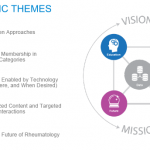
In the late 18th century, Prussian military theorist Carl von Clausewitz said, “Our knowledge of circumstances has increased, but our uncertainty, instead of having diminished, has only increased. The reason of this is that we do not gain all our experience at once, but by degrees; so our determinations continue to be assailed incessantly by fresh experience; and the mind, if we may use the expression, must always be under arms.”
While the work of the ACR is far different than the work of an 18th century Prussian military force, and basic tenets ring true. Strategic thinking and planning has been a recipe for success for the ACR for more than a quarter of a century. Our vision statement in 2010 was, “To enhance the value and impact of rheumatology in a changing healthcare environment.” Indeed, the “changing healthcare environment” has been a moving target, and we have been “assailed incessantly” by those changes.
Planning for ACR’s Future
Late in 2012, we convened a task force to develop the strategic plan for 2013–2016, to strategically think about how best to represent our members moving into the future. ACR Board of Directors (BOD) members Will Harvey, MD, and Sharad Lakhanpal, MD, led us through a process to identify and address the critical needs of the membership and of the field of rheumatology. There was broad agreement that the plan would need to focus on what the ACR must offer and/or change to remain relevant to our members, while taking a proactive approach in addressing the never-ending changes to healthcare. The 22-member Strategic Planning Task Force (SPTF) was constituted to represent the diversity of ACR membership, including leadership, practice setting, research activity, pediatrics, health professionals, age, and gender. ACR staff members also contributed in the development of the plan. The SPTF considered a wealth of information, including a broad survey of the membership, recommendations from committee chairs, an SPTF survey, the report of the Blue Ribbon Panel on Academic Rheumatology, and the report from the 2020 Task Force.
Not surprisingly, common themes emerged from a review of the major reports and surveys that were considered by the SPTF. The issue of healthcare economics, the Affordable Care Act, and a perplexing array of possibilities for payment reform surfaced as the most commonly cited external threats to our members and to the field of rheumatology. Similarly, our difficulty in having the value of our field recognized by key stakeholders was frequently cited as an issue that we must address. Our highly successful Simple Tasks campaign is increasing our visibility, but the issue of value continues to present a challenge for us. Workforce issues came through loud and clear, with grave concerns for the future of academic rheumatology—the training ground for the future of our field—and for the future of rheumatology practice as we know it today. Internally, the existing IT infrastructure of the ACR was viewed as an impediment to development of novel educational content and delivery modalities, as well as our ability to expand the reach of our organization nationally and around the globe. Further, as everyone becomes busier and busier, and many of us struggle with multiple, competing responsibilities and priorities, the ACR must find a way to reshape volunteerism and give more of us a chance to share our passion and our unique skills and abilities.
Everyone Will Know
The Strategic Plan (at left) has several important components, including a statement of the ACR’s mission (core purpose), values (what we believe in), and big goals for the future—the vision statement. The strategic component of this plan, in contrast to prior efforts, represents goals of the ACR that address critical needs of the membership and of the field of rheumatology. The strategic goals are outcome-oriented statements intended to guide and measure the ACR’s future success. The achievements of each goal will move the organization towards the realization of our vision: Everyone will know the essential role and value of the specialty of rheumatology. The SPTF believes that our 2010–2012 mission statement continues to capture our raison d’être—now, more so than ever—so they recommended the addition of an exclamation point: Advancing Rheumatology!
The new strategic focus for this plan should be considered as a guiding document outlining our highest priorities. We will continue the critical, committee-based work of the ACR, work that provides rheumatology’s principle source of advocacy and practice support, premier educational programming and journals, support of our research agenda, standard-setting for quality in our field, and the development of our Rheumatology Clinical Registry. Committees will focus on our strategic priorities, and may consider the thoughtful, expert reports of the Blue Ribbon Panel and the 2020 Task Force to develop strategies, tactics, and projects to achieve the goals that we have set. Internally, we will continue to manage the ACR in a fiscally responsible way, ensuring that we will continue to lead our profession from a position of strength.
We expect that the Strategic Plan will be a living document. It will be reviewed by the BOD and committees at each meeting and can be modified, if necessary, with approval of the BOD. We will use it as a guide to follow our progress and determine when changes in course are required.
In creating this plan, the SPTF and the BOD considered some future states; a forecast of what the landscape may look like if we achieve these strategic goals. The characteristics of this landscape include improved quality of life for patients, improved quality of life for rheumatologists, a sufficient pipeline for our clinical and academic workforce, a top–impact factor journal, and international recognition through increased membership and collaborations. The overarching theme of this future is a big and audacious goal that, if achieved, would mean that everyone will know the essential role and value of the specialty of rheumatology, and we have truly advanced rheumatology!
Special thanks to our fantastic SPTF, to the co-chairs, Will and Sharad, to the members of the Blue Ribbon Panel, and the 2020 Task Force (see below for a full list of participants), and to all of you who provided critical feedback in our surveys. Special thanks to Mark Andrejeski, our executive VP, who carries the torch of strategic thinking and planning, and to our outstanding staff for their creativity and commitment. I look forward to working with many of you for the rest of this year, and for many years to come as we advance rheumatology!
Dr. Uknis is professor of medicine and senior associate dean for admissions and strategy at Temple University in Philadelphia. Contact her at [email protected].
The ACR 2013–2016 Strategic Plan
Mission Statement
Advancing Rheumatology!
Vision Statement
Everyone will know the essential role and value of the specialty of rheumatology.
Core Values
The ACR endorses the following core values in support of our vision and mission: professionalism, service to members, vitality of the profession, excellence in patient care, transparency, and innovation.
By 2016:
GOAL A: The ACR will develop tools to address evolving payment reforms, increase practice efficiency, and improve quality of care.
GOAL B: The ACR will increase recognition of the value of the specialty of rheumatology.
GOAL C: The ACR will strengthen research and training in rheumatology.
GOAL D: The ACR will provide an IT infrastructure to deliver ACR initiatives.
GOAL E: The ACR will reshape volunteerism.
GOAL F: The ACR will increase its international outreach and presence.
GOAL G: The ACR will meet the changing educational needs of our members and stakeholders.

